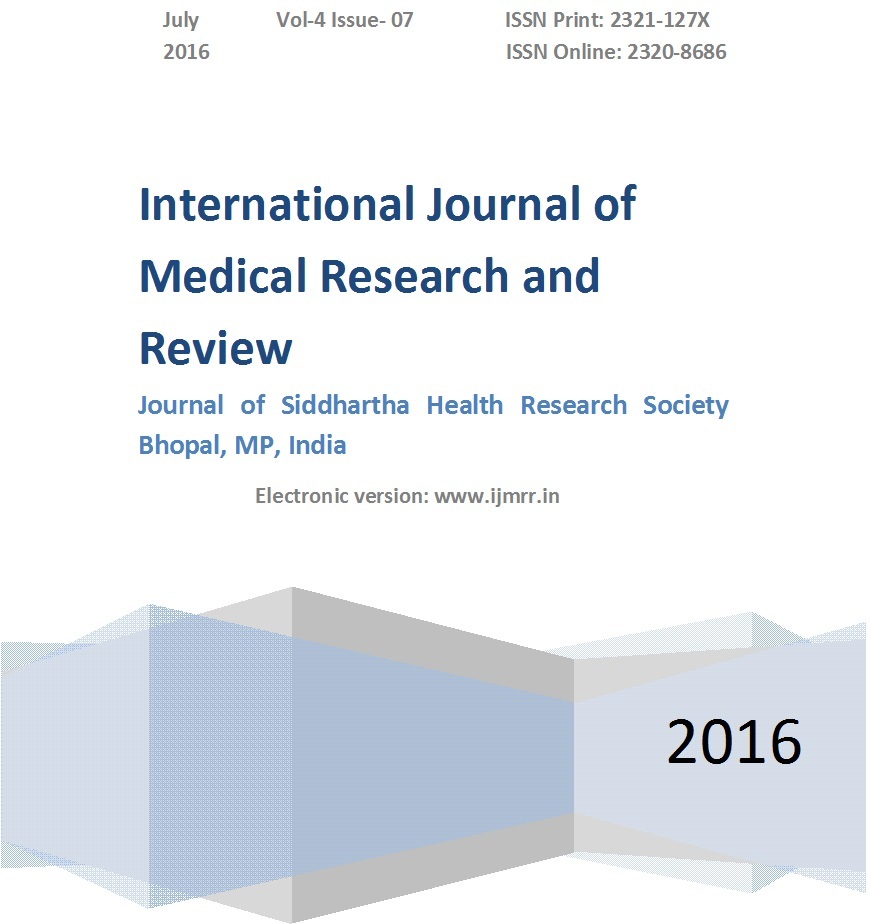Pattern of anemia in geriatric patients- A hospital based prospective study
Abstract
Introduction: Anaemia is common in elderly age group and is overlooked as the symptoms such as fatigue, weakness, shortness of breath may be attributed to the ageing process itself but decline in the haematological parameter with age is not necessarily as a result of normal aging. Low Hb is a powerful prognostic marker for multiple adverse outcomes in the elderly. Clinicians should be alerted to the increased risk of morbidity, hospitalization and mortality in the elderly associated with anemia.
Aim of study: To evaluate the prevalence of geriatric anaemia, morphological pattern of geriatric anaemia and to find its commonest morphological pattern amongst the geriatrics in hospitalized patients.
Material and Methods: A hospital based observational prospective study of 6 months from August 2015 to January 2016 conducted in haematology section of Pathology department at L. N. Medical college and RC and attached J. K. Hospital Bhopal, M.P. in which 200 hospitalized geriatric patients both male and female above the age of 60 years were included and were evaluated for the prevalence of anemia in both the genders along with morphological pattern of anemia.
Results: Prevalence of anemia in geriatrics including both sexes is 69% (n=138/200). In female group 73.68% (56/76) and in Male group there were 66.12% (82/124) anaemic cases. Most common morphological pattern is normocytic normochromic anaemia i.e 37.68%.
Conclusion: Study of various morphological patterns of anaemia helps in guiding aetiology of anaemia and thus directing towards the further required investigations facilitating the choice and implementation of effective therapy.
Downloads
References
Bhasin A, Rao MY. Charecteristics of anemia in elderly: A hospital based study in south India .Indian journal of hematology and blood transfusion 2011 ;27(1):26-32.doi: https://dx.doi.org/10.1007%2Fs12288-011-0056-4.
Hee-Seon Kim and Byung-Kook Lee. Cross-sectional study on the prevalence of anemia among rural elderly in Asan. Nutr Res Pract 2008; Spring; 2(1):8-12.doi: https://dx.doi.org/10.4162%2Fnrp.2008.2.1.8.
Global Health and Ageing : National Institute on Aging , National Institute of Health, U.S. Department of Health and Human services, WHO
Ferrucci L, Semba RD, Guralnik JM et al. Proinflammatory state, hepcidin, and anemia in older persons. Blood. 2010 May 6;115(18):3810-6. doi: https://doi.org/10.1182/blood-2009-02-201087. Epub 2010 Jan 15.
World Health Organization. Definition of an older or elderly person. Retrieved August 29, 2010. http://www.who.int/healthinfo/survey/ageingdefnolder/en/index.html.
Helda Khusun, Ray Yip, Werner Schultink and Drupadi HS Dillon. World Health Organization Hemoglobin Cut-Off Points for the Detection of Anemia. Journal of Nutrition 1999; 129:1669-74.doi: https://doi.org/10.1093/jn/129.9.1669.
WHO, UNICEF, and UNU, Iron Deficiency Anaemia: Assessment, Prevention and Control, A Guide for Programme Managers, WHO, UNICEF, UNU, Geneva, Switzerland, 2001, http://www.who.int/nutrition/publications/micronutrients/anaemiairondeficiency/WHONHD01.3/en/index.html.
Tabea Geisel, JuliaMartin et al: An Etiologic Profile of Anemia in 405 Geriatric Patients, Hindawi Publishing Corporation Anemia Volume 2014, Article ID 932486, 7 pages.doi: https://doi.org/10.1155/2014/932486.
E. A. Price, R. Mehra, T. H. Holmes, and S. L. Schrier. “Anemia in older persons: etiology and evaluation, ”Blood Cells, Molecules, and Diseases, vol. 46, no. 2, pp. 159–165, 2011
Guralnik Jack M, Eisenstaedt RS, Luigi Ferrucci. Prevalence of anemia in persons 65 years and older adults. Blood 2004; 104:2263-9.doi: https://doi.org/10.1182/blood-2004-05-1812.
World Health Organization. Definition of an older or elderly person. http://who.int/healthinfo/survey/agingdefnolder/en/index.html. Retrieved August 29, 2010
Benoist BD Mc Lean Erin, Egli Ines, Cogswell Mary. Worldwide prevalence of anemia. 1993-2005: WHO Global Database on Anemia. Spain: WHO, 2008.https://apps.who.int/iris/bitstream/handle/10665/43894/9789241596657_eng.pdf;jsessionid=3FB34421E7D01F52363ACE349F581FC6?sequence=1.
Stedman's medical dictionary (28th ed.). Philadelphia: Lippincott Williams & Wilkins. 2006.p. Anemia. ISBN 9780781733908.
S. Amarneel and N. Sheth. Pattern of Anemia in Elderly Age Group IJSRR 2015, 4(2),51 – 56
Saurabh R Shrivastava1*, Surekha B Hippargi1 Patterns of Anemia in Geriatric Age Group JKIMSU, Vol. 2, No. 1, Jan-June 2013.https://pdfs.semanticscholar.org/af83/d4543fa4ff96328704baed2794ce5cfbaa0f.pdf.
Chernetsky A, Sofer O, Rafael C. Prevalence and etiology of anemia in an Institutionalized geriartic population. Harefuah, 2002; 141:591-4,667.
E. M. Inelmen, M. D’Alessio, M. R. A. Gatto et al., “Descriptive analysis of the prevalence of anemia in a randomly selected sample of elderly people living at home some results of an Italian multicentric study,” Aging, vol. 6, no. 2, pp. 81–89, 1994.doi: https://doi.org/10.1007/BF03324220.
M. E. Salive, J. Cornoni-Huntley, J. M. Guralnik et al., “Anemia and hemoglobin levels in older persons: relationship with age, gender, and health status,” Journal of the American Geriatrics Society, vol. 40, no. 5, pp. 489–496, 1992.
R. Eisenstaedt, B. W. J. H. Penninx, and R. C. Woodman, “Anemia in the elderly: current understanding and emerging concepts,” Blood Reviews, vol. 20, no. 4, pp. 213–226, 2006.doi: https://doi.org/10.1016/j.blre.2005.12.002.
A.R. Nissenson, L. T. Goodnough, and R. W. Dubois, “Anemia: not just an innocent bystander?” Archives of Internal Medicine, vol. 163, no. 12, pp. 1400– 1404, 2003
Ania BJ, Suman VJ, Fairbanks VF. Incidence of anemia in older people: an Epidemiologic study in a well defined population. J Am Geriatric Soc 1997; 45: 825-31.doi: https://doi.org/10.1111/j.1532-5415.1997.tb01509.x.



 OAI - Open Archives Initiative
OAI - Open Archives Initiative


